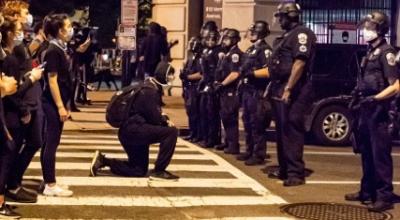Blog categories
- News (14)
- Conferences (2)
- New Editions (0)
- About a paper (4)
- New Members of the Team (0)
Kneeling for Change and Conversations
The outrage and grief that has reverberated around the globe following George Floyd’s death has been marked by the breath-filled voices and somber kneeling in heartfelt expression for justice by a courageous, diverse, and committed movement. The protesters expect nothing less than effective and long-lasting change ...
‘I can’t believe what you say, because I see what you do’ James Baldwin.
... We are seeing an uprising of unrest that is reacting to what has been generations of systemic brutality, lack of justice, and shameful acts of inhumanity. Rather than lingering in what Jung terms a ‘pettifogging unconsciousness’ we can but hope that humanity is now being shaken out of apathy, despite our indolence and ‘often desperate resistance’ (Jung, CW 7, para. 290). Allowing ourselves to be emotionally moved by this collective uprising means also investigating our own internal unrest and discomforts that live close to our bones.
Clearly, analytical psychology has a relationship with whiteness that has disenfranchised and disempowered cultures and people of color in training, the consulting room, and throughout the world. We recognize that these issues need to be continually explored and taken into consideration. At the same time, analytical psychology provides unique and creative doorways into discussions with each other, with the intent of cultivating and growing a consciousness that respects and supports all living beings. In our professional lives we strive to create respectful dialogue and dismantle assumptions that disempower other human beings. In order to facilitate change, we need to commit to join this work with our everyday lives.
It is helpful to remember that psychoanalysis is generally subversive, if only because it is committed to intra-psychic justice, freedom of expression and maintaining open spaces for diversity and democracy of emotions to become conscious. As is purported by analytical psychology, we are encouraged to investigate and confront our personal shadow through delving into uncomfortable and complex feelings, such as shame, grief, rage and humiliation. That includes not shying away from investigating our own capacity for brutality, domination, and power complexes. It means confronting our own racism. We are also called to consider the ways we fall into indifference, apathy, or silence because of a terror that we may lose our privileged and everyday comforts, whether it be in the consulting room, or out in the world. Words that respond to critical and challenging times can quickly grow empty, lifeless, and without breath unless we embrace the seriousness of this moment in history. It explains why the phrase “I can’t breathe” takes on such power and nothing more needs to be said.
In these times, I want to draw your attention again to the June 2019 Journal, which focused on the topic ‘African American Jungian Analysts on Culture, Clinical Training/Practice and Racism.’ Drawing from the October 2018 conference of the Confederation of Analytical Psychology held in London, this edition features two highly relevant keynote papers and a response. The authors are Fanny Brewster, Alan Vaughan and Helen Morgan. Several other significant articles on race are also included, as well as the ‘Open Letter’ from a group of thirty-five Jungian analysts and academics who believe that Jung’s references and writing on this topic have lacked a formal response. In his editorial addressing race and racism, West states that the edition is ‘one contribution to that process of engagement—hoping to stimulate the interrogation, exploration and challenging of the embedded beliefs and value systems within ourselves, our culture, and our society as well as our analytic institutions and practice’ (West, 2019, p. 304). This editorial and the articles, including the 2019 Fordham Prize winner, Ruth Calland, who explores race in the consulting room, can be found by following this link; the paper is free to access until 2021.
The IAAP also held a conference in Prague in October 2018 to discuss what the response to Jung’s writings on race should be. Papers for this conference can be found in the members section of the IAAP website. It is noteworthy that the XXI IAAP Conference, held in Vienna in August 2019, offered a week’s worth of papers responding to the title “Encountering the Other: Within Us, Between Us, and in the World.” The wide range of topics, with presenters from around the world, focused on the notion of Other through presentations and discussions. These papers will continue to find their way into publications due to their relevance and compelling content that inspires a change in consciousness; one of those, by Jane Johnson, ‘Being white, being Jungian: implications of Jung’s encounter with the “non-European” other’, will be published in the September edition of the Journal.
Nora Swan-Foster

